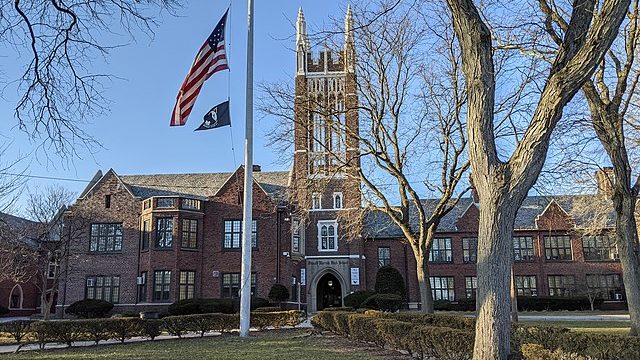
Until recently, community prayer was not only non-controversial, but considered a necessary element of human society. But in the mid-twentieth century, the United States Supreme Court suddenly found that the United States Constitution prohibited offering children the opportunity to participate in this part of community and prayer life. The Court came to this conclusion even though a common call to prayer is a basic element of most human societies, whether it is the 11,000-year-old temple of Gobekli Tepe in Turkey or the temples of Tenochtitlan in Mexico. Of particular importance to the American understanding of religion are the civic religions of Greece and Rome.
In ancient Rome, we encounter a clear-eyed view of religion from the philosopher Varro (116‑27 BC). He explained that ancient religion could be divided into three categories: (1) poetic; (2) civic; and (3) natural. The civic religion was man made and informed by the poets. It was a way for a community to instill the virtue of piety in its citizens. The natural religion touched on the Creator—but because his will was not known, he was not worshiped. Instead, the inventions of the community, like Jupiter or Mars, took his place. Gentiles, like the Romans, had to create their own religions to practice piety. And what you practiced matter little, so long as the official religion was respected and observed. Religion was mainly a civic or political activity—directed to fostering a virtue: piety and social cohesion.
Like any other set of civil regulations, they were meant to be obeyed by the community for the promotion of the common good. Deviations were viewed as forms as treason and atheism, especially in Rome’s imperial era. This, of course, caused extreme conflict with Christianity and resulted in many of the martyrdom stories we are familiar with today. And with that witness and resistance something new had entered the world—a revelation about religion that would cause a revolution.
From Varro’s perspective, and that of other gentiles, he had it right: no one knows what form of worship God wants. Except for a people who had a different view of things, the Jewish people. They had a different experience. Moses had led them out of Egypt on a very different premise–God had revealed himself, and they needed to be free to worship Him as He wanted. This view of things was expanded in new ways with the revelation of Jesus Christ to spread the Good News of God throughout the world.
An interesting tension was created as Christianity spread throughout the Empire. Could a society claim for itself the right to require certain religious observances upon pain of punishment under the theory that they had no better lights to guide them, when citizens knew that God had revealed the form of worship He wanted?
The citizens who knew God, unlike Varro, decided the question in the only rational way that a God-fearing person could: God must be obeyed before men. The whole concept of a truly civil religion is impossible in the light of revelation. Soon this revolution swept the world, and in places where civic and religious leaders converted, the civic religions ended, since they were based on a claim of authority that the community could no longer make: a lack of revelation. But the public role of religion did not end. Indeed, it developed a deeper and more significant role than simply promoting piety, it centered truth and a relationship with God as the primary purpose of religious activity. No longer could government officials, like Pontius Pilate, ask “what is truth” and wash their hands of the moral reality of their choices. They were no longer a law unto themselves, but subject to an ultimate authority.
A healthy limitation on the power of civil government developed, though not without conflict. The government and those with political power were no longer the final arbiter on ultimate matters. Religion was no longer a creature of the state, but rested on a separate authority established by God. We see this tension in historical and legal matters directly relevant to the development of American law and culture. For example, (1) the martyrdom of Saint Thomas Becket with respect to the independent authority of the Church; (2) the guarantee of the independence of the Church in Magna Carta; and (3) King Charles I’s understanding that despite his role as “head of the Church,” he could not alter its episcopal structure established by Christ all point to a fundamental principle of the independence of religion from civil authority. Nor was this independence based on an internal understanding from civil society that it was incompetent in matters or religion, but because it had been revealed that this is how God wanted to govern His church.
But new problems arose. The Great Commission of Christ was a call to invite, not force, the people of the world to accept the Gospel. Yet strife among Christians and prejudices against others led to misuse of religion as a way to persecute. In response, those who rejected Church teachings and wished to form their own communities looked to obtain the levers of political power to do the same. This led to intense conflicts, especially in Europe and in European colonies.
The English colonies continued the British struggle with issues of tolerance and religious unity. Different English colonies in North America took different approaches, eventually settling on some form of established church with religious-freedom protections, to a lesser or greater extent. Just before the American Revolution, 9 of 13 colonies had established religions. At the time of the adoption of the First Amendment, about half of the states had some form of formal support of religion. The last state to end state support for a particular religious confession was Massachusetts in 1833.
The very human need to acknowledge a higher power, to acknowledge the limits on civil government—that the powerful cannot transgress the truth—remained throughout this time. The importance of a community promoting that truth as it best understands it, and encouraging social unity around that commitment to truth, did not diminish or become less relevant after the Revolution. Indeed, whether it is George Washington’s admonition regarding the importance of religion in his Farewell Address, John Adams’s statement that the Constitution presupposed a religious people, or the many other pronouncements of thanksgiving or penance from Lincoln to the modern holidays of Thanksgiving and Christmas, we continue to acknowledge this reality. As President Franklin D. Roosevelt explained in his radio address and prayer to the nation about the storming of Normandy in June 1944, those soldiers were doing nothing less than fighting for “our religion”:
And so, in this poignant hour, I ask you to join with me in prayer: Almighty God: Our sons, pride of our Nation, this day have set upon a mighty endeavor, a struggle to preserve our Republic, our religion, and our civilization, and to set free a suffering humanity.
Needless to say, in this context it becomes quite clear that the First Amendment was not addressing a blanket prohibition on state support of religion or even promoting a particular religion. The words are an express prohibition on the power of Congress to pass any laws “respecting an establishment of religion,” a prohibition on interfering with already established churches. This provision makes sense as a complement to the No Religious Test Clause in the original Constitution. It made it clear that while the Constitution prevented religious tests for federal office, that this was not an indirect way to interfere with state-supported religions.
In other words, the United States, like all other human societies, incorporated a common call to prayer into its public life, including in its public education, despite most states ending what anyone at the Founding would have recognized as an establishment of religion in 1833. The federal government, as well as local and state governments, have continued to support religious observance during government functions and in the community. They have also continued to promote our dependence on a Supreme Being, whether it is the national motto “In God We Trust,” state mottos like South Dakota’s “Under God the people rule,” holidays like Thanksgiving, or prayers before legislative activity or city-council meetings. Because public schools are meant to prepare students for a life as active citizens, it is no surprise that part of that education was learning how to participate in this common call to prayer.
This state of affairs continued until 1962 when the Supreme Court decided Engel v. Vitale, holding that a New York school district violated the Establishment Clause by causing the following prayer to be said by each class: “Almighty God, we acknowledge our dependence upon Thee, and we beg Thy blessings upon us, our parents, our teachers and our Country.”
The New York Court of Appeals (the state’s highest court) upheld the law, finding that law and its application did not “compel any pupil to join in the prayer over his or his parents’ objection.” That seemed straightforward enough—no religious tests, no compulsion, no negative effect on the academic record of the student, nothing preventing a student from participating or advancing the in the public benefit of education attached to his or her religion. In other words, nothing in the scheme would appear to be an establishment in the traditional sense, even assuming that the Fourteenth Amendment incorporated limitations on congressional power to protect federalism against the states.
But let us not put the cart before the horse: does it make sense to incorporate this clause against the states?
The political and historical facts surrounding the adoption of the Establishment Clause make it implausible that it is meant to promote any kind of individual right, rather than federalism. If it was meant to do so, the additional guarantee of every individual’s right to the free exercise of religion in the Free Exercise Clause would be redundant. The first is meant to address the corporate rights of the people in the several states, while the second the individual rights of believers. With this context in place, it makes no sense to incorporate a limitation on the federal government that exists for the benefit of the states against the states. This is also why, in practice, every attempt to do Establishment Clause jurisprudence does not work. And to this day, the Court has no coherent body of law in this space.
But it seems that some judges do not care that they are not doing law. Justice Scalia in dissent pointed out in McCreary County v. ACLU of Kentucky that:
The same Congress [that enacted the First Amendment] also reenacted the Northwest Territory Ordinance of 1787 . . . which provided: ‘Religion, morality, and knowledge, being necessary to good government and the happiness of mankind, schools and the means of education shall forever be encouraged. . . . And of course the First Amendment itself accords religion (and no other manner of belief) special constitutional protection.
So even if you could apply the Establishment Clause against the states, it is clear that there is no sense at its passage that merely supporting religion, even in schools was any kind of violation of its terms. In response, Justice Souter simply dismissed the record and argued that what should control is what the Court has decided is the best policy—not what the law actually means or says: “Historical evidence thus supports no solid argument for changing course (whatever force the argument might have when directed at the existing precedent), whereas public discourse at the present time certainly raises no doubt about the value of the interpretative approach invoked for 60 years now.”
Circling back to Engel and the beginning of that interpretive approach, the Court failed to show that the prayer or scheme was anything like the establishment of the Church of England or explain why the Establishment Clause applied to the states. At every turn, it noted the extreme differences between the scheme in the New York school district and English religious history—especially with respect to coercion and making religious communities illegal. Nothing of the sort was happening in New York, but the violation of the Establishment Clause was found nevertheless, because the government wrote prayers.
The words of Justice Stewart in dissent cannot be improved upon as a critique. In noting that invocations of God and prayer occur at every level of government, including the Court (one can hardly imagine a more coercive environment than its Courtroom, he explained: “I do not believe that this Court, or the Congress, or the President has by the actions and practices I have mentioned established an ‘official religion’ in violation of the Constitution. And I do not believe the State of New York has done so in this case.” And the majority offered no real response other than its ipse dixit.
If schools cannot promote prayer, if the community cannot promote truth as it best understands it, what is the basis for states and communities compelling children under the penalty of law to attend its educational institutions? Gone is the rationale that a community has the duty to ensure that students are taught to value the truth—all truth. Rather than inculcating students in the importance of truth in education, and the duty of students to pursue that truth, what is being taught is that the power to order citizens to study in government-operated institutions is its own justification.
That this is concerning to parents, should come as no surprise. As Joseph Ratzinger, or Pope Emeritus Benedict XVI as some call him, explained in A Christian Orientation in a Pluralistic Democracy, when addressing the Polish parents wanting to keep crucifixes in their children’s classrooms against the communist government’s plan to remove them in 1984:
For the parents in Poland [1984]—as for our parents then [the Third Reich]—the crucifix in the schools is a sign of one last bit of freedom that they do want to let the totalitarian state take away from them. It is the guarantee of a kind of humanity; in the eradication thereof they see the government’s claim to have the human being completely at its disposal in a way that is no longer subordinate to the standard of the Cross and that hence no longer has any standard at all. They are fighting for the public Character of Christianity, and in doing so they are fighting for the basic modicum of humanity and human standards that the state needs, too. When we no longer have the strength to understand and adhere to such signs in their indispensability, then Christianity makes itself dispensable, yet the state thereby becomes, not freer or more pluralistic, but rather groundless. The state needs public signs of what supports it.
The irony here is that we have come full circle. For many civil officials, religion is no longer rooted in a truth that provides a bulwark against tyrannical government and government officials. Instead, government officials ignore legal text, the cultural and jurisprudential history of the country, and the right of a people to promote truth, including religious truth among its citizen. Religion has once again become a relative matter that must be regulated as a matter of policy by government officials, in this case, judges, for the good of the community, rather than a truth revealed by God.
A legal principle of separation rooted in that very revelation has now been twisted to undermine that truth upon which our fundamental rights find their surest foundation: that we, and our children, are created beings made in the image and likeness of God.
By presenting religion this way to children in public school, judges are requiring that they learn a new lesson. They learn that truth is relative. Because if the state cannot acknowledge a power outside itself, a truth that limits it, then the power of the state is its own justification. Crucially, the state cannot acknowledge the most important truth about itself—that it is not an end but a means to help individuals and communities strive towards truth and justice. Instead of learning that human life is ordered to truth, including ultimate truth, children learn that life is nothing more than proving your worth through accomplishing tasks and training for jobs.
This threatens the health of the republic by creating a culture that encourages a relativistic approach to state power through public education. But it does something worse. It encourages children—in what can already be a cruel and isolating world—to think that there is not a God who loves and knows each of them by name when we know otherwise—for in America “In God We Trust.”





